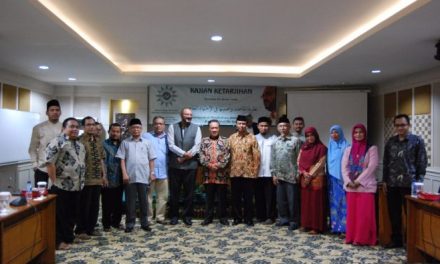
In his well-known book, Al-Hikam (Words of Wisdom), sheikh Ahmad Ibn `Ataa’illah As-Sakandari says:
A person is not humble if he thinks that he is above his act of humbleness. A humble person thinks he is below his act of humbleness.
Humbleness is a basic trait of those journeying to Allah and a characteristic that every servant should be keen on maintaining. Arrogance is the opposite of humbleness and is a serious flaw, as discussed before.
The Prophet (peace and blessings of Allah be upon him) said: “He who has in his heart the weight of a mustard seed of arrogance shall not enter Paradise”. The Companions said: “But a man likes to wear a nice robe and nice sandals”. The Prophet replied: “This is not arrogance. Arrogance is denying the truth and injustice to people”. (Reported by Muslim)
Allah Almighty says:
{And turn not your cheek away from people in false pride, and walk not haughtily on earth: for, behold, Allah does not love anyone who, out of self- conceit, acts in a boastful manner.} (Al-Qasas 28: 83)
{As for that happy life in the hereafter, We grant it only to those who do not seek to exalt themselves on earth, nor yet to spread corruption.} (Luqman 31:18)
Some people behave humbly with others, but at the same time, they think and feel that they are superior to them! This is arrogance and it has nothing to do with humbleness. Humbleness should come from the heart. The Sheikh explains that a person who is humble with others thinks that he is indeed inferior to them.
The question is: How does one reach that feeling of humbleness? The answer is: by considering faith. Perhaps someone is clearly inferior to me in terms of position or wealth. However, if I consider faith as my criteria for status, I have to tell myself: Perhaps he is much closer to Allah than me, or his belief is much stronger than me. Perhaps he is afflicted with some real trails in this life and he is enduring them patiently and wisely for the sake of Allah. He could very well be better than me at the sight of Allah.
Sahl al-Sa`idi narrated that:A man passed by the Prophet and the Prophet (peace and blessings of Allah be upon him) asked his Companions: “What do you say about this man?” They replied: “If he asks for a lady’s hand, he ought to be given her in marriage; and if he intercedes for someone, his intercession should be accepted; and if he speaks, he should be listened to”. The Prophet kept silent, and then a man from among the poor Muslims passed by, and the Prophet (peace and blessings of Allah be upon him) asked them: “What do you say about this man?” They replied: “If he asks for a lady’s hand in marriage, he does not deserve to be married, and if he intercedes for someone, his intercession should not be accepted; and if he speaks, he should not be listened to”. The Prophet said, “This poor man is better than so many of the first as filling the earth”.(Reported by Muslim).
The first evaluation given by the Companions was based on material standards or ‘stereotypes’, as we say today. The real evaluation considers the faith criterion only, and this what the Prophet applied. The second man, in terms of faith, is better than billions of the likes of the first man.
The real humbleness is to see yourself inferior to others because piety is the criterion for status and nobility. According to the Qur’an, {Verily, the noblest of you in the sight of Allah is the one who is most pious.}. (Al-Hujurat 49:13) And this criterion is known only to Allah, {He knows best as to who is pious.} (An-Najm 53: 32)
A clear evidence of the Prophet’s humbleness is that he would change his opinion if it is proved to be wrong after consulting his Companions on community affairs.
A humble person, the Sheikh says, is not the one who thinks that he is above his act of humbleness. A humble person is the one who thinks he is below his act of humbleness.
Look at the example of the Prophet (peace and blessings of Allah be upon him) who was ordered by Allah the Almighty to: {spread the wings of your tenderness over the believers.} (Al-Hijr 15: 88) Spreading the wings of tenderness is the same expression that Allah used for the attitude of a believer with his/her parents: {And spread over them humbly the wings of tenderness.} (Al-Israa’ 17: 24) This is the highest rank of humbleness.
Furthermore, Allah also commanded the Prophet: {Pardon them, then, and pray that they be forgiven, and take counsel with them in all matters of public concern.} (Aal `Imran 3:159) These are the characteristics of a humble leader, to pardon people, pray that they will be forgiven, and consult them. Anyone who thinks that he does not need people’s consultation, or does not need to learn because he knows and understands everything is not a humble person; rather, he is arrogant. We seek refuge in Allah from arrogance.
At the battle of Badr, the Prophet wanted to camp in a certain place. One of the Companions wanted to propose another place for camping. The Companion, al-Habbab, asked, “O Messenger of Allah, is your opinion based on a revelation from Allah, or is it war tactics and strategy?” The Prophet replied: “No, it is war tactics and strategy”. So al-Habbab proposed, “Then this is not the most strategic place to camp”. Prophet Muhammad (peace and blessings of Allah be upon him) accepted his advice.
Salman al-Farisi, the Persian Companion of the Prophet, suggested digging a trench to defend Madinah against the attackers and the Prophet applied his idea.
Allah created us differently in terms of reason, position, health, wealth, and so on. But having one or more of these traits is not a reason for arrogance. In fact, one should be grateful to Allah if he/she is blessed with Allah’s blessings. This is an act of worship by the heart. A humble person is not the one who shows humbleness in front of people or feels in his own heart that his status is above his act of humbleness. A real humble person is the one who feels that he is inferior to people and that he needs them, their advice and their prayers for him.
====
ٍSource: www.onislam.net — Ibn Ataa’s Pearls of Wisdom — Jasser Auda






